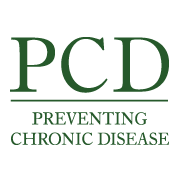PCD News Summary for March 2, 2017

About the Journal
Published every Thursday, Preventing Chronic Disease (PCD) is a peer-reviewed online journal established by CDC’s National Center for Chronic Disease Prevention and Health Promotion. The News Media Branch prepares press summary packets each week. To receive these press summaries on an embargoed basis, send an e-mail to media@cdc.gov. Please note that this e-mail list is for credentialed journalists only. All others, please visit Hookup to Health to sign up for e-mail updates
Notice to News Media - PCD Release Time and Embargo Policy:
CDC’s News Media Branch releases to reporters the PCD media packet every Tuesday afternoon between 12 and 2 pm.
Embargoed until Thursday, March 2, at 12:00 PM ET
Food Policy Council Self-Assessment Tool: Development, Testing, and Results
Melissa Newton
mnewton@cdc.gov
404-718-6281
A self-assessment tool can help food policy councils identify issues within the food system in their communities, coordinate food-related programs, and inform food policy. Food policy councils are organizations that bring together diverse members of the community to inform food policy and to coordinate or implement programs that aim to increase food access. While there are more than 250 food policy councils in the United States, Canada, and Tribal Nations, there is no research-tested evaluation tool specifically for food policy councils. Researchers addressed this gap by adapting an assessment tool to apply to food policy councils. In this study, researchers report the results of psychometric testing of the Food Policy Self-Assessment Tool. Food policy councils and those who work with them can use it to determine councils’ functional strengths and areas for improvement. Additionally, the assessment tool could also be used to measure changes in internal council function before and after a capacity-building or technical-assistance intervention.
Identification of Patients With Diabetes Who Benefit Most From a Health Coaching Program in Chronic Disease Management, Sydney, Australia, 2013
Melissa Newton
mnewton@cdc.gov
404-718-6281
Diabetes health coaching programs can improve glycemic control and reduce diabetes distress in patients with high levels of these at baseline. Patients with diabetes were enrolled in a health coaching program at Royal North Shore Hospital, Sydney, Australia, in 2013. Questionnaires were administered at baseline and at 3, 6, and 12 months, and the results were compared with baseline. Glycemic control, measured with glycated hemoglobin A1c (HbA1c) and BMI, were measured at baseline and 12 months. Overall, 238 patients attended a face-to-face chronic disease management programs session with telephone follow-up or participated in telephone-only health coaching. Researchers found no change in body mass index in either group; however, HbA1c levels in patients with baseline above the current recommended target decreased significantly from 8.5 percent to 7.9 percent. Patients with the lowest self-reported health status at baseline improved from 4.4 percent to 3.7 percent Diabetes knowledge improved in all patients, and diabetes distress decreased among those with the highest levels of distress at baseline.
###
Note: Not all articles published in PCD represent work done at CDC. In your stories, please clarify whether a study was conducted by CDC (“a CDC study”) or by another institution (“a study published by CDC”). The opinions expressed by authors contributing to PCD do not necessarily reflect the opinions of CDC or the institutions with which the authors are affiliated. PCD requests that, when possible, you include a live link to the article in your stories.
###
U.S. DEPARTMENT OF HEALTH AND HUMAN SERVICES
CDC works 24/7 protecting America’s health, safety and security. Whether diseases start at home or abroad, are curable or preventable, chronic or acute, stem from human error or deliberate attack, CDC is committed to respond to America’s most pressing health challenges.
- Page last reviewed: March 2, 2017
- Page last updated: March 2, 2017
- Content source:
Error processing SSI file


 ShareCompartir
ShareCompartir